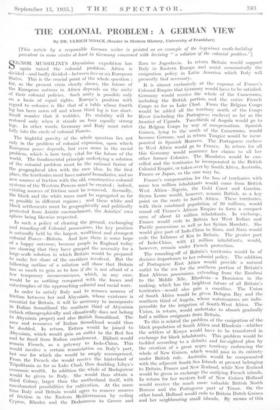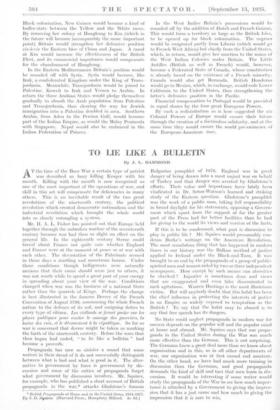THE COLONIAL PROBLEM : A GERMAN VIEW
By DR, ULRICH NOACK (Reader in Modern History, University of Frankfurt)
[This article by a responsible German writer is printed as an example of the ingenious castle-building prevalent in some circles at least in Germany concerned with devising - " a solution of the colonial problent,"j SIGNOR MUSSOLINI'S Abyssinian expedition has again raised the colonial problem. Africa is divided—and badly divided—between five or six European States. This is the crucial point of the whole question ; for, as the present crisis clearly shows, the future of the European nations in Africa depends on the unity of their colonial policies. Such unity is possible only on a basis of equal rights. Europe's position with regard to colonies is like that of a table whose fourth leg has been sawn off and whose third leg is too short. Small wonder that it wobbles. ' Its stability will be restored only when it stands on four equally strong legs. In other words, Germany and Italy must enter fully into the circle of colonial Powers.
The frightful gravity of the whole question lies not only in the problem of colonial expansion, upon which uropean peace depends, but even more in the racial Problem, which is here truly vital for the future of the world. The fundamental principle underlying a solution of the colonial problem must be the rational fusion of the geographical idea with the race idea. In the first Place, the territories must have natural boundaries, and no new sources of friction with the old, constructive colonial systems of the Western Powers must be created ; indeed, existing sources of friction must be removed. Secondly, the black and the white races must be segregated as far as possible in different regions ; and these white and black settlements must be geographically and politically Protected from Asiatic encroachment, the Asiatics' own sphere being likewise respected.
In such a policy of clearing the ground, exchanging and rounding-off Colonial possessions, the key position is naturally held by the largest, wealthiest and strongest colonial Power—Britain. And here there is some hope Of a happy outcome, because people in England today are shoWing that they have grasped the necessity for a large-scale.- solution in which Britain would be prepared to make her share of the sacrifices involved. But the following outline of a solution will show that Britain has as much to gain as to lose if she is not afraid of a few temporary inconveniences, which, in any case, would be as nothing compared with the losses and catastrophes of the approaching colonial and racial wars.
In order to satisfy Italy and to remove sources of friction between her and Abyssinia, whose existence is essential for Britain, it will be necessary to incorporate in Italian Somaliland the southern third of Abyssinia (which ethnographically and climatically does not belong to Abyssinia proper) and also British Somaliland. The area and resources of Italian Somaliland would thus be doubled. In return, Eritrea would. be joined to Abyssinia, which would gain an outlet to the Red Sea and be freed from. Italian encirclement. Djibuti would remain French, as a gateway to Indo-China. This would involve a certain renunciation on Italy's part, but one for which she would be amply recompensed. Prom the French she would receive the hinterland of Tripolitania as far as Lake Chad, thus doubling Libya's economic wealth. In addition the whole of Madagascar Would' be given to Italy. She would thus obtain a third Colony, larger than the motherland itself, with unexhausted possibilities for cultivation. At the same time Italy and Britain would agree to remove sources of friction in the Eastern Mediterranean by ceding Cyprus,' Rhodes and the Dodecanese to Greece and Zara to Jugoslavia. In return Britain would support Italy • in Eastern Europe and assist economically the emigration policy in Latin America which Italy will presently find necessary. It is almost exclusively at the expense of France's Colonial Empire that Germany would have to be satisfied. Germany would receive the whole of the Cameroons, including the British portion, and the entire French Congo as far as Lake Chad. From the Belgian Congo would be added all the territory north of the Congo River (including the Portuguese enclave) as far as the frontier of Uganda. Two-thirds of Angola would go to the Belgian Congo by way of compensation. Spanish Guinea, lying to the south of the Cameroons, would become German, and in return Tangier would be incor- porated in Spanish Morocco. The Portuguese enclave in West Africa would go to France. In return for all this Germany would renounce her claims to all her other former Colonies. The Mandates would be can- celled and the territories be incorporated in the British Colonial Empire, or taken over by South Africa, Australia, France or Japan, as the case may be. France's compensation for the loss of territories with some ten million inhabitants would come from British West Africa—Nigeria, the Gold Coast and Gambia. Sierra Leone would, however, remain British, as a key point on the route to South Africa. These territories, with their combined population of 20 millions, would roluid off France's African Empire to form a compact area of about 45 million inhabitants. In exchange, France would cede to Britain her West Indian and Pacific possessions as well as her Syrian Mandate. She Would give part of Indo-China to Siam, and Siam would cede the Isthmus of Kra to Britain. The greater part of Indo-China, with 15 million inhabitants, would, however, remain under French protection. The rounding-off of Britain's territories would be of decisive importance to her colonial policy. The addition of Portuguese East Africa would provide a natural outlet to the sea for the southern portion of Britain's East African possessions, extending from the Zambesi to the Middle Nile. Rhodesia—a Dominion 'in the making, which has the brightest future of all Britain's territories—would also gain a coastline. The Union of South Africa would be given Delagoa Bay and the southern third of Angola, whose watercourses are indis- pensable for the irrigation Of South-West Africa. The Union, in return, would undertake to absorb gradually half a million emigrants from Britain. To this is related the problem of the emigration of the black population of South Africa and Rhodesia—whither the settlers of Kenya would have to be transferred in exchange for black inhabitants. This problem would be tackled according to a definite and far-sighted plan by the creation of a great negro territory embracing the whole of New Guinea, which would pass in its entirety under British rule. Australia would be compensated With the adjacent South Sea Islands at present belonging to Britain, France and New Zealand, while New Zealand would be given in exchange the outlying French islands. In return for her western half of New Guinea Holland Would receive the much more valuable British North Borneo and the Portuguese part of Timor. On the other hand, Holland would cede to Britain Dutch Guiana and her neighbouring small islands. By means of this Black colonisation, New Guinea would become a kind of buffer-state between the Yellow and the White races. By removing her colony at Hongkong to Kra (which in the future will become incomparably the more important point) Britain would strengthen her defensive position vis-ii-vis the Eastern bloc of China and Japan. A canal at Kra would increase the effectiveness of the British Fleet, and its commercial importance would compensate for the abandonment of Hongkong.
In the Eastern Mediterranean Britain's position would be rounded off with Syria. Syria would become, like Irak, a confederated Kingdom under the King of Trans- jordania. Meanwhile, Transjordania would be joined to Palestine, Koweit to Irak and Yemen to Arabia. In return the three Arabian States would pledge themselves gradually to absorb the Arab population from Palestine and Transjordania, thus clearing the way for Jewish immigration into a Palestine doubled in area. Southern Arabia, from Men to the Persian Gulf, would become part of the Indian Empire, as would the Malay Peninsula with Singapore. Nepal would also be embraced in the Indian Federation of Princes. In the West Indies Britain's possessions, -would be rounded off by the addition of Dutch and French Guiana. This would form a territory as large as the British Isles, to be opened up for black colonisation. The negroes would be emigrated partly from Liberia (which would go to French West Africa) but chiefly from the United States, which, in return, would give her sanction to the union of the West Indian Colonies under Britain. The Little Antilles (British as well as French) would, however, become a Federated State of Canada, whose constitution is already based on the existence of a French minority. Canada would also get Bermuda. British Honduras would go to Mexico, which, in exchange, would cede Lower California to the United States, thus strengthening the latter's defensive position in the Pacific.
Financial compensation to Portugal would be provided in equal shares by the four great European Powers.
By such a redistribution as is here suggested the six Colonial Powers of Europe would ensure their 'future through the creation of a frictionless solidarity, and at the same time they would ensure the world pre-eminence of the European-American race.







































 Previous page
Previous page